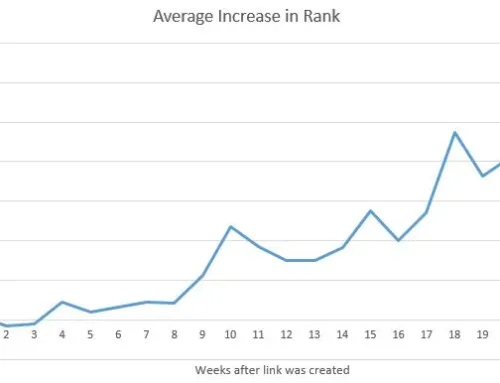
“Authoritative backlinks are everything”.
I heard this constantly when I was just starting to learn about SEO. At first, I thought it was just another bit of industry hype. But over time, I realized how true it is.
You may be an experienced marketer, like me, or just starting a blog online. In both cases, understanding the power of authoritative backlinks makes a world of difference.
What is an authoritative backlink?
Let me break it down the way I wish someone had explained it to me early on.
A link to your content from a trustworthy, well-known website in your niche is an authoritative backlink. Think of well-known blogs, news websites, and industry resources. People and search engines already trust these kinds of sites.
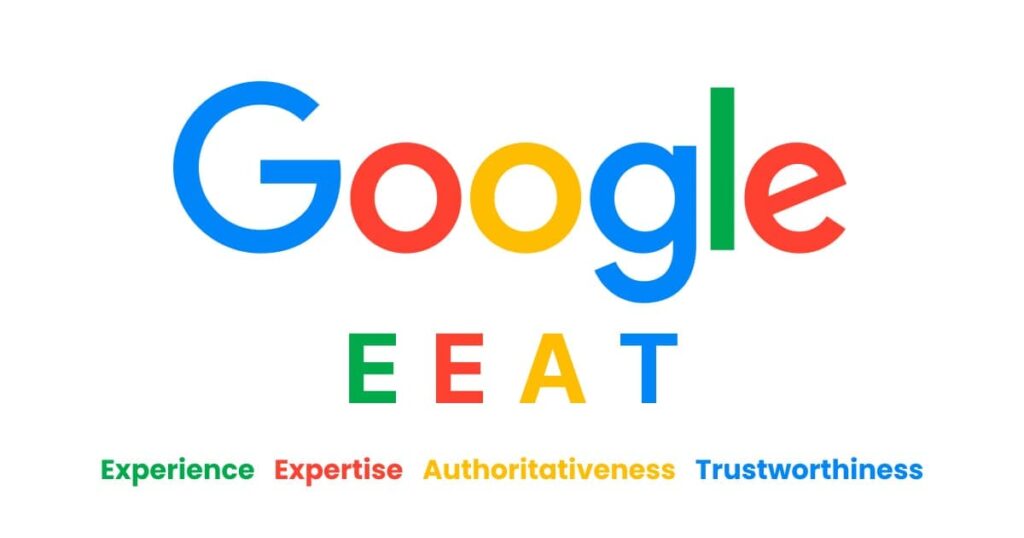
Google emphasizes a concept called E-E-A-T, which stands for:
- Experience,
- Expertise,
- Authoritativeness,
- Trust.
Getting authoritative links from an authoritative source is a direct signal of all four qualities.
The structure of a strong backlink
Search engines look for specific qualities in a link. Here’s a list of them:
- Site-level authority. The link comes from a website that is reliable and well-known. Google’s internal scores are private, but SEOs use metrics like Ahrefs’ Domain Rating and Semrush’s Authority Score to figure out how strong a website is.
- Relevance to the topic. Google’s algorithms understand context, so a link from a page about your topic sends a powerful signal.
- Editorial placement. Google gives much more weight to links that are organically placed within the main body of content.
- “Dofollow” status. To pass authority and influence on rankings, a link must be a “dofollow” link. Other attributes, such as rel=”nofollow”, rel=”sponsored”, or rel=”ugc”, tell search engines not to pass ranking signals, although Google now treats “nofollow” as a “hint” rather than a strict directive.
- URL from a fresh domain. The first link you get from a new, useful website is very important. Links from the same site after the first one are also useful, but they don’t give you as much value.
Why do authoritative backlinks matter so much?
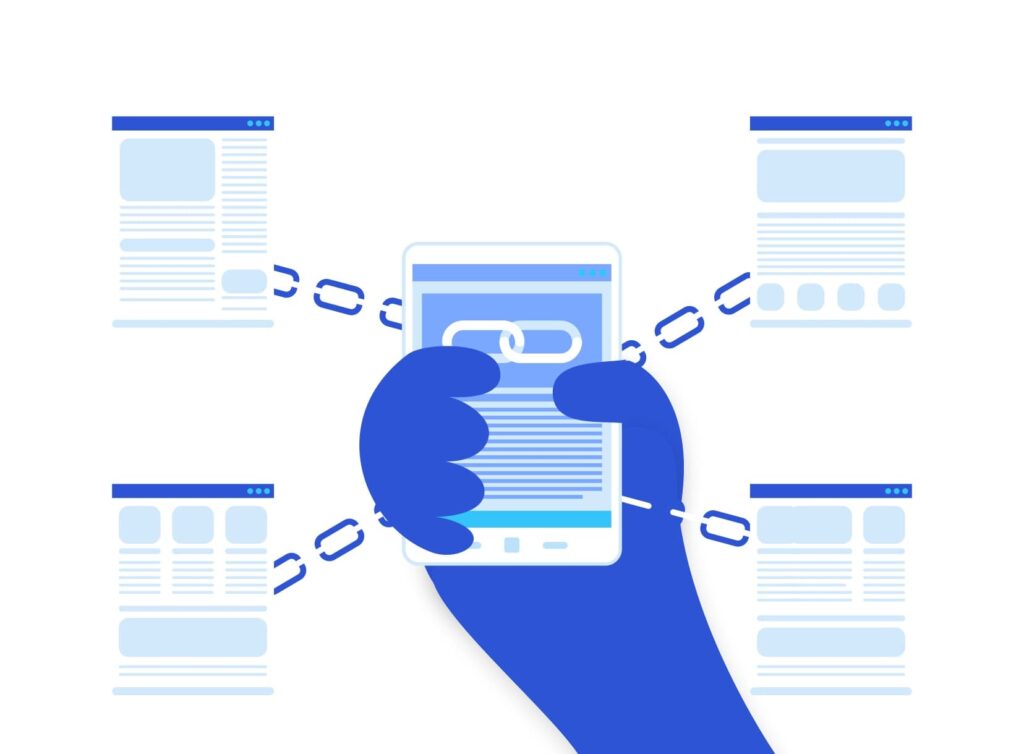
The last two years have been some of the most unstable in SEO history. Google has made a lot of big updates to search results. Let’s revisit the reasons why Google backlinks are so important.
The AI overviews imperative
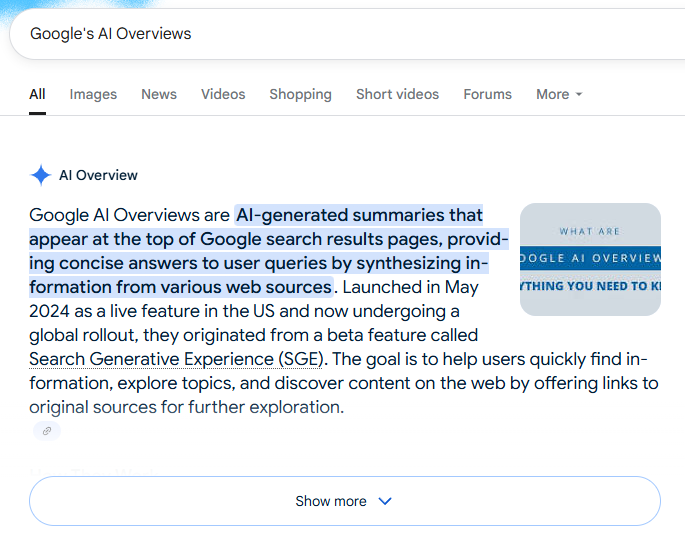
The biggest change in search is the rollout of Google’s AI Overviews. These AI-generated summaries appear at the top of the results page.
⁉️ The challenge. Publishers claim that traffic is declining, and some note that CTR for certain queries drops by more than 50% when AI review is present.
💡 The opportunity. 75% of the links and citations within AI Overviews come from websites ranking in the top 12 organic positions.
This data point changes what the goal of modern SEO is. You must first rank on page one to appear in the AI Overview. Securing authoritative external links remains one of the most powerful factors for achieving top rankings. Backlinks marketing is the key to ensuring your brand is part of the AI-generated story.
Trust and credibility
When a well-known site links to you, it shows that your content is worth reading. I’ve seen how one good link from a trusted source can change how people see your blog or brand. Today, a genuine recommendation from a human expert is the ultimate sign of credibility.
Better rankings in Google
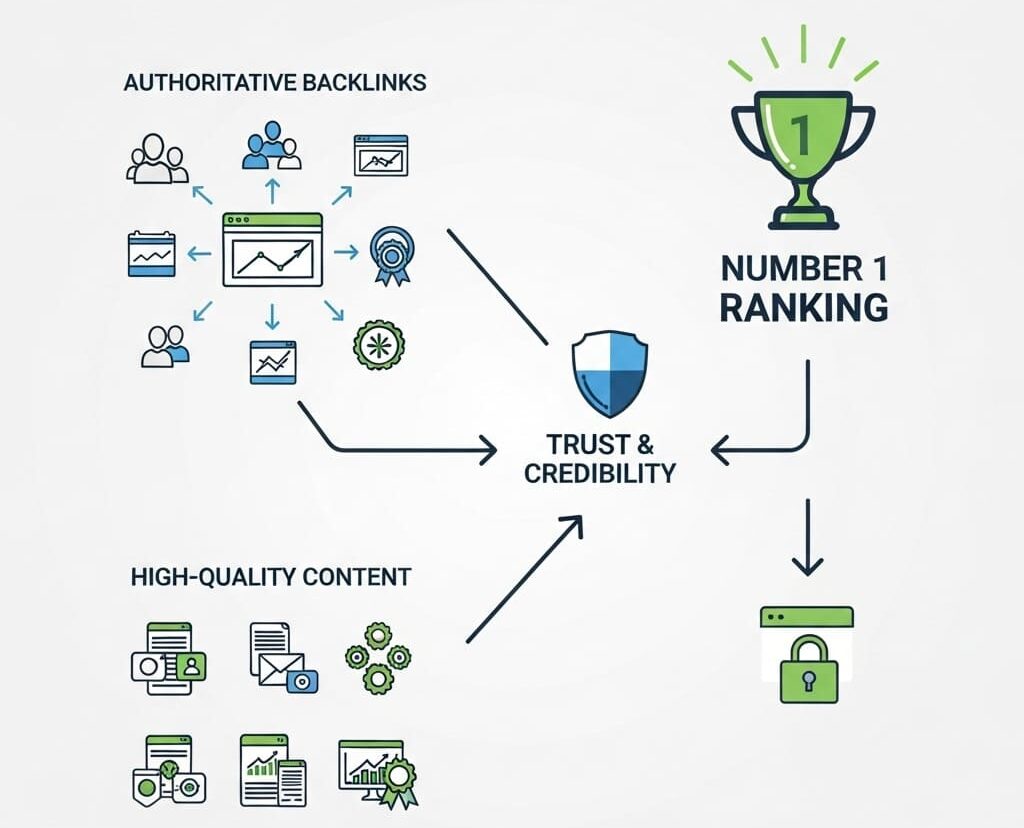
Google’s Helpful Content System now prioritizes content that is genuinely useful for people. A link from a site with topical authority tells Google your content belongs in that helpful ecosystem. A few high-quality Google backlinks will boost your rankings more than a hundred random ones.
Real traffic from real people
A link from a popular site brings real visitors who are already interested in your topic. Google also pays attention to user experience signals. When visitors from a respected site land on your page and stay, it reinforces the value of that backlink. This kind of traffic is far more valuable than anything you’d get from paid ads or spammy tactics.
Building connections
To get these authoritative external links, you need to reach out, collaborate, and network. You will connect with editors, writers, and other site owners. Some of my best professional relationships started with a simple backlink request or a guest post pitch.
How do I get authoritative backlinks
Here’s what works for me. It’s a strategy that considers all types of backlinks.
Guest posting
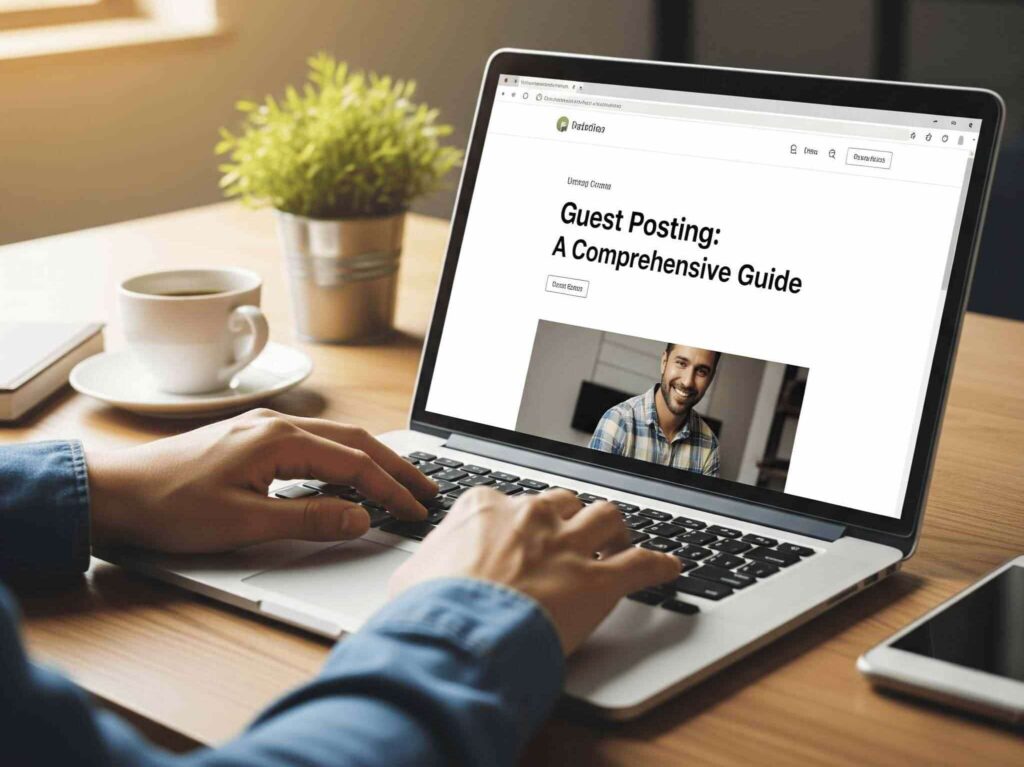
Still one of the best ways to earn quality links. I look for blogs or websites in my niche that show expertise. Then, I pitch them content ideas I’d want to read myself. If you write a guest post.
💡 Pro tip: To make your guest post pitch irresistible, use a tool like Ahrefs’ “Content Gap” analysis. Enter your target blog’s domain and the domains of its top competitors. The tool will show you keywords their competitors rank for, but they don’t.
Creating content people want to share
Instead of just blog posts, I focus on creating “linkable assets”. This includes deep guides, original articles, data-driven blogs, and infographics. This type of content naturally earns links because journalists and other creators need data to cite. This approach, often referred to as Digital PR, is a core strategy for modern link building. If you publish something great, people will find it.
PR & Outreach
Sometimes I’ll just reach out directly to someone running a blog or content site and explain how my content can help their audience. AI tools can help find relevant contacts and personalize outreach, but your message must always be genuine. Not every pitch works, but when it does, the result is powerful.
Using social media and forums smartly

Links from social platforms may not directly boost your SEO, but they help people discover your content. And if the right person sees it, you might earn a new backlink. Share your expertise in communities like Reddit or LinkedIn.
Reclaiming unlinked mentions
Sometimes a site mentions my brand or blog but forgets to add a link. I use tools like Google Alerts to track these mentions, then I politely ask for the link. This works more often than you’d think. Google also associates unlinked mentions with your brand’s authority, so this is a win-win.
💡 Pro tip: Use advanced Google search queries to find mentions that tools might miss. For example, search for: intext:”Your Brand Name” -yourdomain.com -twitter.com -facebook.com to find mentions across the web, excluding your own site and major social platforms.
Broken link building
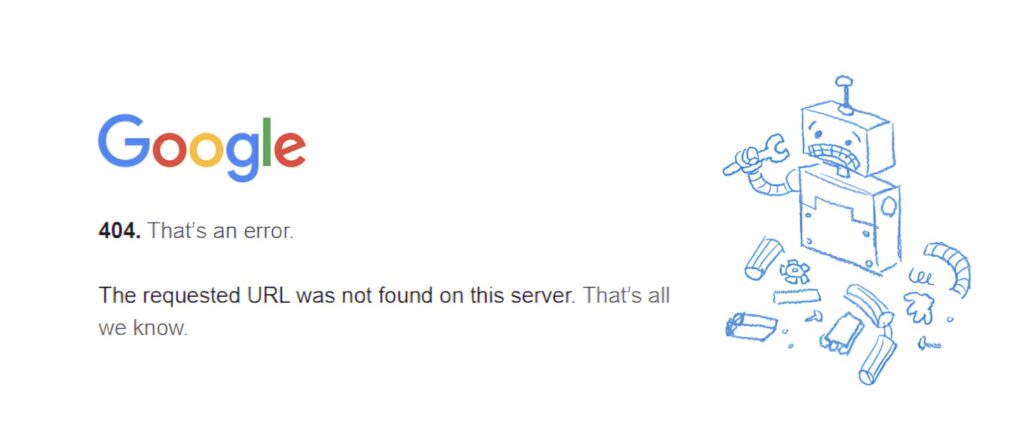
You find a broken link (a 404 error) on a website in your niche, then contact the site owner to suggest a relevant content as a replacement. It works because you’re helping them fix a problem on their site, which makes them much more receptive. How to do ip appropriate:
- Find prospects. Look for resource pages or older articles on authoritative sites in your niche.
- Scan for broken links. Use a free Chrome extension like “Check My Links” to scan the page for dead links.
- Offer a replacement. Find an alternative to the broken resource within your content.
- Reach out. Send an email pointing out the broken link and offering your content.
Mistakes I’ve learned to avoid
- Chasing quantity over quality. Early on, I wasted time collecting weak links. Now I know: five strong links beat fifty spammy ones.
- Forgetting about anchor text. The clickable text in a link matters. Your anchor text should be relevant, but you must avoid unnatural keyword stuffing.
- Neglecting internal links. While I focus a lot on external backlinks, I’ve learned not to ignore the internal ones. A strong site structure helps spread authority throughout your own site and matters more than most people realize.
- Ignoring topical relevance. A link from a high-authority site is great, but if it’s from a completely unrelated industry, it carries far less weight. A link from a moderately authoritative but highly relevant site is often more valuable because it provides strong contextual signals to search engines.
To sum it all up
Authoritative backlinks aren’t just nice to have. They help people find your content, build trust, and improve your rankings.
Getting them takes time, creativity, and effort, but it’s worth every second. Put in the work. Focus on building real value and strong relationships. If you do this, the powerful links will follow.
That’s been my journey here at Buylinkco.com, and I hope sharing it helps you on yours.
Frequently asked questions
What’s more important: the number of backlinks or the number of unique websites linking to me?
The number of unique websites that link to you, or “referring domains”, is much more essential than the total number of backlinks. This addresses the question of how many backlinks are good by focusing on diversity.
Are “nofollow” links useless for SEO?
No. Although “dofollow” links are the primary type that passes direct SEO authority, “nofollow” links still offer significant benefits. Google now treats the rel=”nofollow” attribute as a “hint” rather than a strict command. All types of backlinks can play a role in a healthy backlinks marketing strategy.
Can I use AI to help with my link-building outreach?
Absolutely. Modern AI tools can analyze a prospect’s recent articles, social media activity, or professional profile to generate unique and relevant opening lines (also known as “icebreakers”) for your emails.


